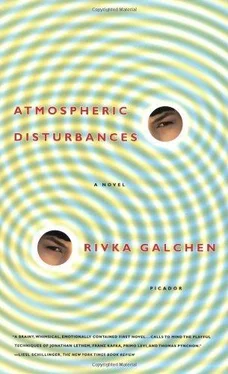We can similarly consider the “errors” of a suspected psychosis, the discrepancies between the presumably psychotic vision of reality and a consensus view of same. Such an examination could (occasionally, conceivably) reveal something other than prismatized fragments (taste of powdered milk + old woman with cataracts + holes in a navy sweater + fresh pretzels = navy poisons milk that the old pretzel factory workers drink down blindly) of the presumed psychotic’s mind. Because although psychosis is often popularly conceived of as an infection or a kind of foreign body, a psychosis is in fact as personal, as eccentric, as interpretable as a dream. Its content comes straight from the mind of its victim, even as its form may be an aberration. (Consider the fact that over the past two hundred years the incidence of religious psychoses has significantly declined, while that of erotic ones has risen. Surely it is not the mental illnesses that have changed but rather the societies of people affected by them.) And so although we can call the process of transforming reality into an alternate reality “madness,” we should not forget that the landscape of that alternate reality, all the molecules that make it up, come from the banalities of the life of the madman himself. Therefore each psychotic experience is singular, a fingerprint.
Investigating the origin of particular “errors” could, theoretically, solve the proverbial problem of distinguishing the prophet from the madman: if the “psychosis” were text, whom would you surmise to be the author? If the text reflects the fears, desires, or expectations of the “afflicted,” then most likely he or she has authored his or her own vision. A man who fears rats may envision a rat king, and a fanatic television watcher may believe she has her own evening talk show, and a reader of tales of chivalry may believe himself to be a knight errant. But: if, say, an auto worker from Minnesota claims conscious blades of grass are plotting an overthrow of the Ecuadorian government, you should at least listen awhile before assuming it’s another case of self-scripting. Because why would that be on his mind? What does he care for Ecuador? Or grass? If a story seems too random, or perhaps too brilliant, for a “madman” to have conceived of it himself, then consider that the “author” might be reality and the “madman” just the reader. After all, only reality can escape the limits of our imagination.
Why do I bring all this up?
When Rema disappeared, I chose to take myself on as my own patient, so I asked myself, did I “write” this new world, or was I just reading it? Reading what was “in reality” actually there? Well: I have never wanted or feared or expected Rema’s replacement by a double, nor have I ever wanted or feared or expected my involvement in a weather-controlling cabal. If I were to have Rema-based psychosis, surely it would take a more mundane form: I’d be convinced that she was seeing other men, or women, or that she contemplated my murder, or that she moonlighted in a massage parlor, or that she had never existed at all, that she had always been just a figment of my imagination, an incarnation of all the women I’ve always wanted but could never have. Or that she was (gasp!) my mom — something banal and pre-scripted and conventionally Mad Lib — y like that. I would not have come up with this drama that is my actual current life. I just don’t have those kinds of thoughts.
And since I could not detect my authorial hand in my strange new world, I could only conclude (at least, so to speak, with a p ≤ 0.05) that it was being perceived accurately. That was the most valid extrapolation from the data that could be made. And that’s why I felt so confident about my decision to speed south to Patagonia, in anticipation of my meteorological labor, which I felt sure would bear some fruit, even if unexpected ones, even if ones I could not divine. It was kind of a wild plan, I admit, but one that came to me, and not from me, and one that therefore (I decided) should be heeded.
2. Variant case of Dopplerganger effect in effect
Consider again that diagram from Tzvi’s article. Is it not the image of a man leaving reluctantly? Is it not a portrait of me, leaving first my apartment, then the comfort of Rema’s childhood home, in order to carry on my sad and uncertain search? How strange, the resemblance.
But isn’t it more strange that in continuing my search for Rema, in (in fact) boldly pursuing a meteorological assignment (under the guise of a young ice climber named Arthur) for which I was in no way prepared, isn’t it strange that through all this — sneaking out the bathroom window of Magda’s home, paying full fare for a turbulent plane ride over Rorschach-y mountain ranges, enduring fierce winds off the silty blue Lago Argentina in search of reasonable shelter amidst the ersatz log architecture of El Calafate, witnessing the indignity of a sidewalk “impromptu” tango performance in that soulless tourist town, entertaining unnecessary self-doubt as I passed an establishment called El Quijote — well, isn’t it strange that through all those obligatory banalities I gave hardly a thought to Rema, instead thought only, and obsessively, of Tzvi Gal-Chen?
I did ask myself if my oddly directed mental attentions were really just feelings for Rema transferred onto — translated over to — Tzvi. Well, if so, it wasn’t as if I couldn’t put that transference to good use. If I worked out an aspect of my evolving feelings for Tzvi Gal-Chen, I might — I reasoned — solve something about my feelings for Rema. And if I could determine the mysterious location of Tzvi Gal-Chen, then might I not learn something of the whereabouts of Rema? Or maybe there was no transference at all; Tzvi had been so helpful to me, and perhaps my growing gratitude toward him was appropriate. I had, before leaving, written him more about the situation with Rema, and about the job offer from Lola; Tzvi had reframed my current life as a diagnostic-prognostic problem, like the one central to his own work in “A Theory for the Retrievals.” And he made an ennobling comparison of my situation to that of a Greek hero. “Go south,” he bid me. “Surely you’ll learn something. About yourself. About the work of the Royal Academy.” And he had listened so patiently to my detailing of how the doppelganger differed from my original Rema. Yes, he had listened as a true friend.
As I waited for my hotel room to be ready — Tzvi’s paper affirmingly noted: “Remotely sensed data … can be grossly inadequate …”—as I warmed myself before a proverbial and actual hearth in the too-tastefully-homaged-to-ancient-cultures lobby of a serviceably nice inn, a vibration in my pocket disturbed me. I answered my phone.
“Hello? Hello? Hello?”
Rema’s voice was what I recognized, maybe because I wanted to believe it was Rema, but also maybe because it really did sound like her, but probably just because a new stimulus extinguishes an old one with astonishing speed, and I had heard the simulacrum speak so much more recently than I had heard the real Rema.
“You disappeared again,” the voice said through tiresome tears.
“May I ask with whom I’m speaking?” I inquired politely.
“It’s me, Leo. You know that,” continued the soppy sad voice, which, objectively speaking, was less sharp, less fiercely lovable, less accented than Rema’s. The real Rema would have cut right to business, no matter how emotional — even because of how emotional — she might be. She would have asked me exactly where I was and she would already have been booking her flight, maybe mine too, and she’d furthermore already be befriending the manager of the hotel.
“And from where are you speaking?” I asked.
Читать дальше
Конец ознакомительного отрывка
Купить книгу












